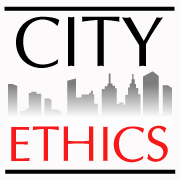Open vs. Confidential Ethics Commission Proceedings
The Model Code makes Ethics Commission investigations confidential. However, upon a finding of probable cause, Ethics Commission proceedings become public. In addition, disclosure statements, advisory opinions, waiver requests, and documents filed in Ethics Commission proceedings are public.
Please share your opinions on and experiences with the confidentiality vs public nature of Ethics Commission proceedings and documents. What problems are created by each, and why are each of them important? How does a community balance the two?
 New City Ethics Inc.
New City Ethics Inc.